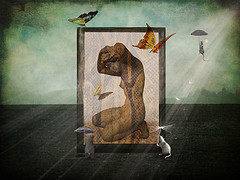Engagement Balance Decision
No disguise can long conceal love where it is, nor feign it where it is not. ~ François de La Rochefoucauld
I’m passionate about certain topics. Some themes in politics and religion and life in general are not matters of disinterested observation but of deep commitment. In the last year, I’ve become very frustrated – angry even – about how malleable people can sometimes be, about how fearful, paranoid and even hateful the manipulated populations can become. Inchoate, thick with sadness, I feel claustrophobic – surrounded by ignorance and misunderstanding, perversions of thought, and the misinformation and disinformation campaigns that seem to function just fine for whoever pours enough money into the effort.
Our culture alienates us and turns us away from one another’s authenticity. It caricatures, scapegoats and demonizes its own. It allows bald-faced lies to parade as truth, and it appeals to the worst aspects of us – in the name of God or good. You can taste it sometimes. It’s acrid.
I’ve heard a lot of anger – often horribly misplaced – and far too much destructive and misinformed prattle. It erupts in unexpected places sometimes, and that’s very depressing. Not all arguments are equal in value. Knowledge is always partial and biased, but there are statements that are closer to the truths we can grasp than others will ever be. To me, it’s more about creating balance in fairness, in justice.
Some of the schemers have overplayed their hand. The values of this country at its best are being reflected back to us in new ways. Perhaps that mirroring can yet defamiliarize us and then catalyze recognition effects in that mythical “average American” that so flattens out our complexities into illusion and prejudice.
“Intellectual freedom is essential to human society. Freedom of thought is the only guarantee against an infection of people by mass myths, which, in the hands of treacherous hypocrites and demagogues, can be transformed into bloody dictatorships.” ~Andrei Dmitrievich Sakharov
Engagement on topics that mean something to me is fruitless when there is no understanding of what counts as an argument. I don’t enjoy trying to create dialogue with unworthy adversaries. In this respect, I have become what many would call an elitist. It means something to me – so contribute something worthwhile! Why else would I care about what you say? Yes, it’s a free country. Think whatever you like in the sacred space of your mind. Say whatever you like, too. However, I’m under no obligation to take what you say seriously or to engage with you in dialogue unless there is some hope of real and serious communication. I’m willing to hear and judge for myself, just as you are. Here and there… discernment still flows. I no longer have the inclination to play in arenas where it is palpably absent.
If the only object of a discussion appears to be a simple lashing out at perceived or imaginary adversaries, especially combined with a lack of information or any reasonable picture of context or reality, it’s not really a conversation – it’s just an emotional beating. I’m no masochist. Anyone can look up the rules of argument, the necessary grounds of dialogue, the guidelines of debate. Why should I engage when the dialogue doesn’t observe the conventions of simple civility?
Sometimes I get the sinking feeling that I’m being played as I get drawn into these discussions that are more about abuse than enlightenment. Such predatory games are extremely infuriating. Claims attempted on me because of some historical association or commonality of interest just aren’t enough to move me anymore.
The other day a former Jehovah’s Witness asked me why I had defriended him on Facebook. He thought it was “very sad” that it appeared to be because of a discussion on his wall. My response:
I’ve found that the ex-JW connection isn’t always enough. There are many people who remain confused, broken, and with deep imprints of thought patterns and habits. Some of these I can embrace, even support and help. Others infuriate me because I can see the blocks and the slave mentality that survives, or I can see an unthinking flipside of meaningless rebellion. I tend to spend my time on the ones that have an ability for self-reflection, transformation, kindness and flexibility. I have little patience anymore for uninformed propaganda parroting, or false piety, or manipulations.
Outside of that consideration, I’ve developed a rule of thumb about FB friends in general. If I see more than a few posts that push my buttons and make me angry, it’s just better for my mental health to defriend. I give it my best shot a couple of times, but it’s not my responsibility to teach or guide or inform and when it becomes more of a negative than a positive experience, I just walk away. It’s too short of a life to embroil myself in impossible dialogues.
I am writing this explanation to you simply because you were kind enough to ask. Best wishes –
It is difficult for me to write such things. I feel that I should somehow be available to everyone and anyone – in concern, in caring. However, I’m also much more keenly aware of the relative merits and effects of my interactions as I’m spread so very thin. I re-read what I wrote. And again.
Why should, why would I engage in and even seek out such discussions? Why do I so often feel compelled to participate? I have a choice. I can choose the occasion, the level, the tenor, the style. Why haven’t I had the discipline and meta-flexibility to do that more often? I think it’s because I’ve not been caring enough for my own needs.
I need nourishment. I need sustenance. Time is running through my hands.
I’m drawn more and more to the projects and pursuits that I have delayed for far too long. How much of what I do is really worth my limited time? Deeper affinities and sympathies are necessary. They have become – Necessary.
If this means that I become less accessible, less visible – what of it? Service is, after all, a valuable gift to oneself as well as to others. The best hope with some is just to plant a seed and trust to the winds anyway. My own best insights have often been a result of such actions by others.
There are so many avenues to explore, so many meandering paths, so many divine moments and details. Should all of this be discarded or postponed – deferred – simply for the sake of a paltry and very secondary urge to persuade others to my own point of view? It has to be an honest exchange. Where there is no scene of the between, why bother?
I’ve drowned myself in this superfluous uselessness for too long. There are too many other things to do, to think, to find.
I have real friends. I have a real home. I have a real job. I have a real book to write. I have real dreamtime to enjoy. I have real communion.
AND – I got my smile… I got life, brother.

 The sin bucket is never full because it
The sin bucket is never full because it 

